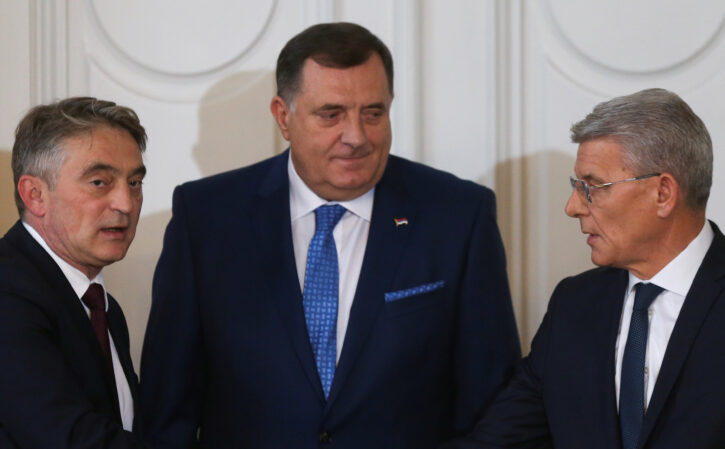
The past year was a turbulent one for Bosnia and Herzegovina as the country spent most of it without forming a new government, with politicians quarrelling whether it should join NATO or not, an influx of migrants it could not properly handle and brain-drain that has left villages and towns without youth.
Bosnia formed a government in November, nearly a year after elections, spending the year arguing whether to send a document to NATO. That was eventually done in December.
The Bosniak and Bosnian Croat Presidency members refused to support the candidate from the party of their Serb colleague who was supposed to take over the position of the Council of Ministers Chairman – effectively the Prime Minister – until Bosnia sends the Annual National Programme (ANP) to NATO, which represents the next step toward membership.
NATO membership is unpopular among Bosnian Serbs, so Presidency member Milorad Dodik refused to let the country send the document.
In the end, the three reached an agreement – a different document, the ‘Reform Programme’, would be sent.
The document was sent hours after the results of the 2018 General Election were implemented at the state-level in December.
This, however, caused protests in the Serb-majority semi-autonomous entity, with the opposition accusing Dodik and his party of betraying Serb interests and pushing the country into NATO.
Meanwhile, Bosniak officials, including Presidency member Sefik Dzaferovic, bickered with leadership in Croatia over a number of issues, including allegations that Croatian intelligence officials and diplomats tried to recruit Muslim extremists to bring weapons and explosives to Muslim places of gathering in central Bosnia. Those claims were corroborated by former Security Minister Dragan Mektic.
Croatian officials vehemently denied the allegations and the issue evaporated from the political scene after a probe found no evidence for such claims.
Bosnian officials complained about Croatia planning to dump its radioactive waste at Trgovska Gora, near the border with Bosnia, which could endanger the health of hundreds of thousands of Bosnians. The issue is yet to be resolved.
Bosnians also protested over an alleged corruption affair involving the top judicial official in the country, the head of the High Judicial and Prosecutorial Council (HJPC). They gathered in front of the office of the country’s international administrator demanding a reform of the judiciary.
Meanwhile, the EU sent an independent expert to the country who put together a report on Bosnia’s judiciary, also suggesting extensive reforms.
Several Bosnian citizens who joined the Islamic State in Syria were repatriated near the end of the year and are facing terrorism charges, with some already being sentenced. Several Bosnian women and children who were held at Syrian camps were also repatriated.
The migrant crisis got even worse as the country has been unable to properly accommodate the scores of people who began arriving in masses with the beginning of 2018. Several migrant centres were set up, others were dismantled. Numerous incidents involving migrants occurred as many of them still stay out in the open although the winter is in full swing.
Bosniaks and Croats were shocked by the latest scandal involving the Swedish Academy of Science whose members awarded a genocide denier and friend of war-crimes suspect Slobodan Milosevic the Nobel Prize for literature. Austrian writer Peter Handke’s prize was welcomed by Serbs in Serbia and Bosnia.



